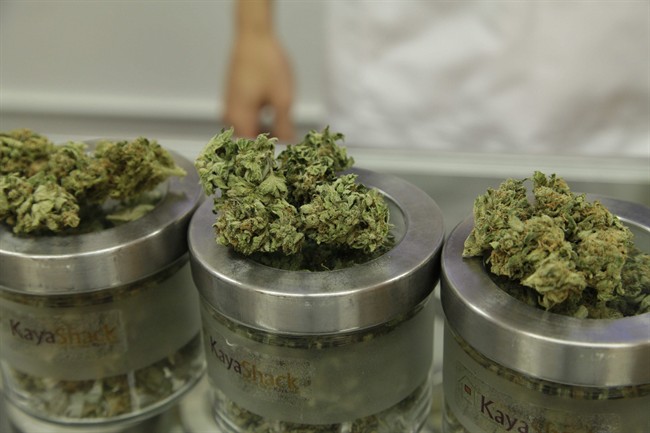Its nicknames include Spice, Scooby Snacks and K2 – health officials across the United States are worried about synthetic marijuana after recording a spike in overdoses and incidents of violent crime.

Synthetic marijuana is often marketed as “smokeable herbal incense,” providing its users with a “legal high.” It looks like potpourri, containing a mixture of dried, shredded plant material that’s laced with chemicals that trigger mind-altering effects.
Yet it’s typically labelled “not for human consumption,” according to U.S. and Canadian-issued health warnings about the product.
READ MORE: Ever heard of marijuana ‘dabbing’? Profs warn of dangerous new pot trend
And for good reason: instances of erratic and violent behaviour spurred on by synthetic marijuana usage have been reported. In one instance, a 19-year-old man ended up in a coma and was declared brain dead, in another, a woman was accused of stabbing her boyfriend while hallucinating on the drug, and in a horrifying incident, a man was accused of decapitating his wife.
“A lot of these products are marketed as natural and safe and that could be the appeal. A lot of these products avoid illegality by changing chemical compounds and packaging the drug as ‘not for human consumption,’” Royal Law, an epidemiologist with the Centers for Disease Control and Prevention, told CBS News.
“We need to let the public know that if anyone has these products, they need to throw them away. People using these products have no idea what is in them,” he warned.
READ MORE: What you need to know about flakka, the latest drug causing erratic behaviour
- Buzz kill? Gen Z less interested in coffee than older Canadians, survey shows
- ‘She gets to be 10’: Ontario child’s heart donated to girl the same age
- Canada updating sperm donor screening criteria for men who have sex with men
- Bird flu risk to humans an ‘enormous concern,’ WHO says. Here’s what to know
Health Canada issued its own warning about synthetic marijuana in 2013: it said that while the product could be offered in some convenience and specialty stores, consumers shouldn’t buy it.
“Health Canada does not recommend consuming any of these products as they are rarely labelled with an accurate ingredient list and consuming them may lead to adverse health effects,” the statement said.
It named agitation, dizziness, anxiety and panic attacks, memory loss, seizures and a rapid heartbeat as some of the key symptoms users may encounter. A New York City warning said that confusion, paranoia and hallucinations are also among the symptoms.
READ MORE: Krokodil, a flesh-eating street drug, is in Canada, reports suggest
In early July, U.S. poison control centres received 4,377 reports of people grappling with the effects of synthetic marijuana, according to the American Association of Poison Control Centers.
The high is supposed to mimic the high that marijuana users get from THC, which is naturally ground in cannabis. With synthetic marijuana, chemicals are sprayed onto the plant, then smoked or eaten.
But the concern is it’s unclear what chemical compounds are involved, so users rarely know what they’re consuming and how potent the designer drug may be.
READ MORE: Candy-flavoured tobacco products enticing Canadian students to take up smoking, survey says
“It’s a misnomer to even call it synthetic marijuana,” Dr. Aaron Schneir, a clinical professor of emergency medicine at the University of California, told the Today Show.
Emergency room visits sparked by marijuana use is a rarity – these days, paramedics and frontline health care workers have had their hands full dealing with cases of illnesses triggered by synthetic marijuana.
“With synthetic cannabinoids, there has been an explosion of visits over the past few years and they haven’t even been around very long,” Schneir said.
Other names for the drug include Crazy Clown, Black Mamba and Bombay Blue.
Now, politicians and paramedics are trying to play catch up: in Boston, a city councillor is proposing a bill that would ban synthetic marijuana. Anyone selling the drug could be fined $300 for each day they continue to sell the product while anyone in possession of the drug could also be slapped with a $300 fine, for example.
READ MORE: Is driving high the new drinking and driving for Ontario teens?
Read the synthetic marijuana drug warnings from Health Canada here, and from the U.S. National Institute on Drug Abuse here.
carmen.chai@globalnews.ca
Follow @Carmen_Chai




Comments